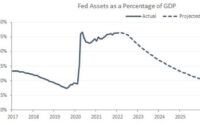FOREX-Dollar rises as hawkish c.banks cast shadow over growth outlook; dent risk sentiment
By Rae Wee
SINGAPORE, June 23 (Reuters) – The dollar drew support from a bout of risk aversion on Friday as hawkish comments from global central banks, including the Federal Reserve, stoked fears that their aggressive monetary tightening could push economies into a deeper downturn.
Sterling struggled to hold gains from a larger-than-expected 50-basis-point rate rise from the Bank of England (BoE) on Thursday in response to sticky inflation, fuelling fears about an impending recession in the UK.
While higher rates are typically supportive of currencies, the risk that they will trigger an economic downturn has pushed some investors to seek safe-haven assets including the U.S. dollar.
The pound fell 0.33% to $1.2707 and was on track for a weekly loss of nearly 1%, snapping three straight weeks of gains.
“With the Bank of England set to raise rates substantially further, we expect the UK economy to come under renewed pressure by late 2023, and look for growth to either stagnate or even for the economy to contract,” said Nick Bennenbroek, international economist at Wells Fargo.
The Australian and New Zealand dollars also struggled in Asia trade as risk appetite waned.
The Aussie tumbled 0.9% to $0.6696 and was headed for a weekly loss of more than 2.5%, its worst week since March. The kiwi slid 0.59% to $0.61405, down about 1.5% for the week.
Rate hike surprises and hawkish comments from central banks globally have renewed market fears that policymakers have further to go in tightening policy to tame inflation, even at the risk of tipping their economies into a recession.
Norway’s central bank on Thursday also stunned markets with a 50 bp rate hike and said it aimed for another hike in August. The Swiss National Bank raised its policy interest rate by 25 bps the same day and signalled more tightening to come.
“Markets are definitely taken by surprise by the recent, more aggressive actions that some central banks had to take,” said Khoon Goh, head of Asia research at ANZ.
“Also putting into question the following trend of other central banks that initially looked like they’ve paused but went on to hike rates … so that’s something that markets are starting to become worried about again.”
The Reserve Bank of Australia and the Bank of Canada had earlier this month delivered surprise rate hikes when markets were leaning towards pauses.
Elsewhere, the euro fell 0.24% to $1.0929.
The U.S. dollar index rose 0.25% to 102.65 and was on track for a weekly gain, reversing three straight weeks of losses.
Fed Chair Jerome Powell said on Thursday the central bank would move interest rates at a “careful pace” from here.
Money markets now see a 74% chance that the Fed will raise interest rates by 25 bps at its policy meeting next month, after leaving it unchanged last week.
THE YEN AND THE YUAN
Against the dollar, the yen fell marginally to 143.19, languishing near an over seven-month low of 143.23 per dollar hit in the previous session.
The Japanese currency has come under renewed pressure as the Bank of Japan (BOJ) continues to maintain its ultra-dovish stance.
Data out on Friday showed that Japan’s core consumer inflation exceeded forecasts in May and an index excluding fuel costs rose at the fastest annual pace in 42 years, putting pressure on the BOJ to phase out its massive stimulus.
The Chinese offshore yuan slid to a fresh seven-month low of 7.2285 per dollar, reflecting concerns over the country’s faltering economic recovery.
Markets in China were closed for a holiday on Friday.
The Turkish lira slid to a record low of 25.59 against the U.S. dollar. Turkey’s central bank on Thursday hiked its key rate by 650 basis points to 15%, but the post-election tightening missed expectations.
(Reporting by Rae Wee; Editing by Sam Holmes and Lincoln Feast)
[ad_2]
Source link


